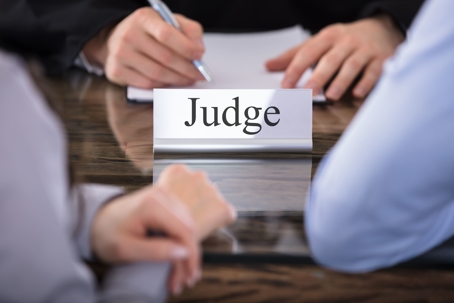Divorces involve a great deal of personal information, relationships, and could involve allegations or revelations by the other spouse attacking your character and hindering the neutral trial. When these arise, many people become concerned as to the bias the judge may be forming against them based upon these claims or relationships between the parties. If you are concerned about your reputation and a possible bias in your case, bring this to the attention of your Orlando Divorce Attorney immediately. We will be able to discuss with you the judicial protocols as well as possible actions that may need to be taken in order to provide you with a fair and neutral ruling.
Florida laws provide a rather simple avenue to disqualify a judge presiding over a case, in order to protect the legal sanctity of a court room, and to ensure the constitutional protection of a resident’s right to a fair and equitable trial. Under Florida Rules of Judicial Administration 2.330, grounds for disqualification of a judge include “fear that [you] will not receive a fair trial or hearing because of specifically described prejudice or bias of the judge; or the judge before whom the case is pending, or some person related to said judge… is a party thereto… an attorney of record in the case…or the said judge is a material witness.” Although the relationship between a judge a party to a case may be easy to prove, the definition of bias is vague and leaves room for interpretation, which could be seen as a negative, however, with the vague nature, there can be many forms of bias to draw on to disqualify a presiding judge.
If you discover that the judge presiding over your case is in some manner related to any of the parties, or attorneys in the case, they may be disqualified from the case. Further, if you sense a bias in your case Florida allows you to request a disqualification if “the judge’s impartiality might be reasonably questioned.” This bias could be towards you or your attorney. Many times, citing the failure of a judge to interact with each side equally, or how their rulings on motions do not support the evidence presented, are manners in which a judge’s bias may come to light. However, any other judgment may fall under the broad umbrella of bias if properly defined. The key requirement is to provide enough information in your motion to satisfy these claims of bias. Upon an initial motion to disqualify a judge, the judge must only find that the motion meets the legal standards required and should immediately disqualify himself. A judge is not required to investigate the claims made in the motion, but rather must accept the facts as true. Therefore, you must only satisfy the statutory requirements in order to receive an initial disqualification.
Allegations and issues that arise in a divorce battle can result in harmful reputation effect and biases. Biases from a judge can significantly harm your divorce case and therefore should be addressed in a professional and timely manner. Therefore, ensure your rights are protected with an Orlando Divorce Attorney who will aggressively fight to minimize bias and take action to promote a fair trial.
Speaking to an attorney at our Orlando office is free of charge, and we accept calls 24 hours a day, 7 days a week. Contact us at 407-512-0887 or complete an online contact form to get in touch with a member of our team today.

